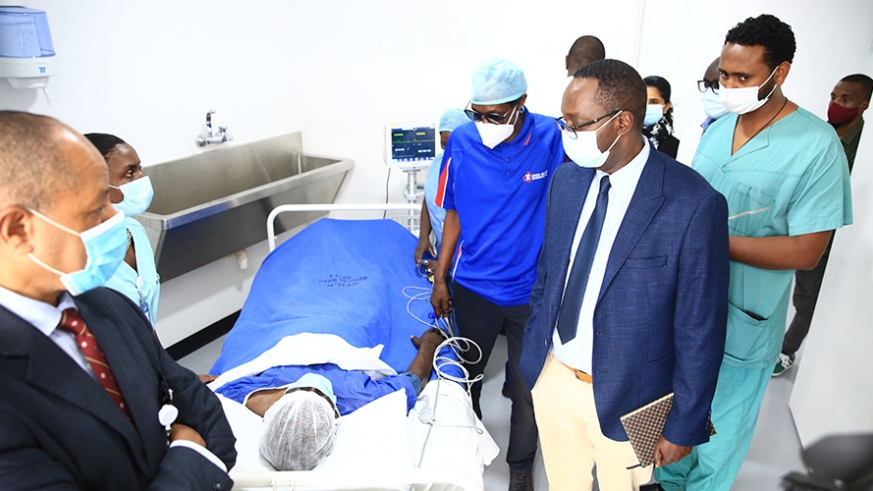Dubbed cardiac catheterization, the technology is the first of its kind in Rwanda’s health sector; although it has been already in use in developed countries to carry out a number of procedures including treatment of cardiac issues, diagnosis, and tests.
During a catheterization procedure, doctors insert a very small, flexible, hollow tube (called a catheter) into a blood vessel in the groin, arm, or neck of a patient; into the aorta and into the heart.
Once the catheter reaches the part that medics want, it is used to carry out several tests plus treatments among other things.
Rwanda’s newly introduced equipment for cardiac catheterization will be stationed at King Faisal Hospital in Kigali where a whole laboratory has been set up and has already successfully handled some cases.
Using this technology, in the previous week medics at KFH have carried out a number of procedures including diagnosing and treating certain cardiovascular conditions; carrying out the very first coronary angioplasty in Rwanda (opening narrowed or blocked blood vessels that supply blood to the heart); coronary stenting (placing tube-shaped devices into the coronary arteries that supply blood to the heart to keep them open); as well as other interventions to correct blood flow, repair holes in the heart or locate blockages in blood vessels.
Many of these procedures were being done in foreign countries before, and the nearest that patients would go for such treatment was Kenya where they would incur at least Rwf 20 million in the process.
On a positive note, besides reduction of the general treatment bills for patients seeking such services, government-based health insurances (both RAMA and mituelle de sante) will cover 90 percent of the hospital bills, meaning that patients under such insurances will pay about Rwf 200,000 to 400,000.
Catheterization technology is not used for all heart surgeries; but it has reduced the need for open heart surgeries in the world.
Speaking about the development, Dr. Miliard Derbew the Chief Executive Officer (CEO) of KFH, said it is a very important development that is not just for saving foreign currency for the country, but is maintaining human life than before.
“So this is a great opportunity for Rwanda as a country and also for the surrounding countries which will access this treatment from Rwanda,” he said.
According to Dr. Gloria Mukeshimana an Intervention Cardiologist at KFH, the technology “is definitely an answer to a big question in the country” as risk factors for cardiac diseases are increasing,
“We are really seeing a rise in hypertension, diabetes, and even obesity is starting to come up in our country which are risk factors for this kind of cardiac pathology,” she said.
According to an estimation the medics made, KFH being the only facility offering such services in the country may receive about 40 patients every month who will come seeking for this kind of treatment.
Edgar Kalimba the Deputy CEO of KFH said the equipment cost about Rwf 800 million RWF, and require Rwf 260 for maintenance every year.
Dr. Daniel Ngamije the Minister of Health said such development is part of the government’s efforts to improve quality of services especially in tertiary health care.
“With the guidance of President Kagame, we want to make change, and in the coming three years we want to see big change in what we are doing as far as tertiary healthcare is concerned,” he said.
“We used to spend a lot of money and lose lives because this intervention could not be conducted here in Rwanda. So today is a good day and I am happy that we managed to do it finally.”
